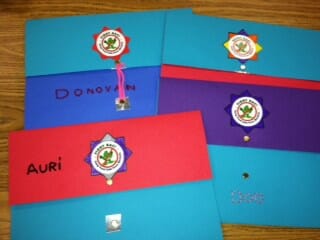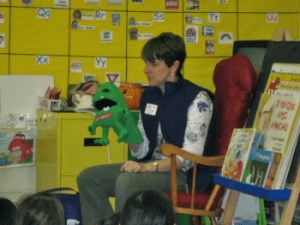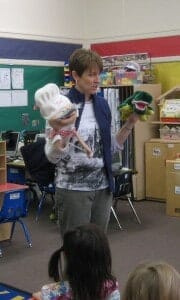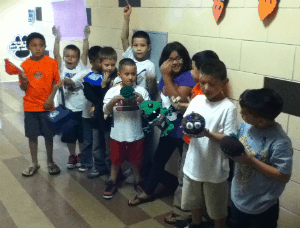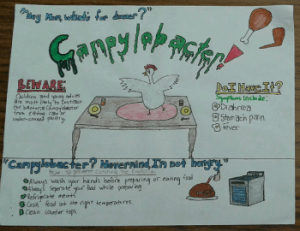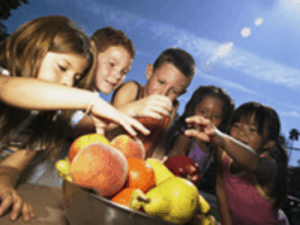Rebecca Richter, a Consumer and Family Science teacher, instructs her 6th grade students on the importance of safe food handling by empowering them to be food detectives. For years, Rebecca has been showing her students the Food Detectives video because her students can relate to its messages. She bases her lessons on this video, encouraging her students to think like detectives figuring out a foodborne illness outbreak. They even use Fight BAC!® stickers to make sheriff-like stars to deputize themselves. Sometimes, Rebecca says, the students tell HER when she is doing something incorrectly like improperly washing her hands. “They get excited for food safety and they take it home with them,” she says, further explaining that her students usually do not hear about safe food handling until they get to her classroom. Watch out- don’t get stopped by a food detective in Meridian!
Kansas Students Take on Food Safety Bad Guy
Teaching pre-school and early elementary children about healthy habits can be challenging. In Cowley County, Kansas, I engage children with a puppet show, hand washing activity, and taste test at “Dinosaur Diner.” During the 30 minute presentation, students learn about the benefits of eating a variety of foods, the importance of food safety, and personal hygiene.
The program features “Dino,” an alligator puppet who loves dinosaurs. “Dino” is concerned that his fellow alligators might someday be extinct because they do not eat a variety of foods. Dino’s goal is to open a restaurant and invite all alligators to be customers.
The children also meet “Chef,” who greets participants with a handshake while reviewing expectations for food safety. However, “Chef” informs the children there is a “bad guy” in the room! The “bad guy” (the BAC Puppet from the Partnership for Food Safety Education) uses a spooky voice to talk about germs and how bacteria will make the students feel “ucky and yucky!”
Students get rid of the “bad guy” by pretending to wash their hands and counting to 20. “Dino” praises the children for their hand washing skills but reminds them they must use real soap and water to kill germs. I utilize UV disclosing lotion and a black light to demonstrate the effectiveness of their real hand washing skills.
The final activity is a taste test of dinosaur dip with a slice of raw sweet potato. “Chef” has participants give a thumbs-up (they like it) or thumbs-to-the-side (please change the recipe) after the taste test. No “thumbs-down” are accepted because if might make “Chef” cry!
Becky Reid is the Family and Consumer Sciences Extension Agent for Kansas State University Research and Extension in Cowley County, Kansas. She can be contacted at bkreid@ksu.edu or620)221-5450. Follow her on Twitter @TechieHomeckie.
School Starts with Food Safety
BAC Fighter Stephanie Castillo plans a packed Food Safety Education Month for Kansas Students
Stephanie Castillo, a BAC Fighter from the Kansas Family Nutrition Program, always kicks off her work in elementary schools with Food Safety Education Month. Last September, Stephanie taught hand washing and food safety to 614 students!
Here are some of the tactics she used to make sure her elementary students got the most out of Food Safety Education Month:
- Interactive tools
Stephanie used a thermometer, ice pack, strainer, scrub brush, and two separate cutting boards to teach students how to practice the four core food safety steps.
- Story time
The He’s BAC Storybook and BAC himself turned story time into food safety time. Stephanie also read Germs! Germs! Germs! and Oh! The Things You Can Do That Are Good For You to teach kids all about staying healthy.
- Pass the germ game
Stephanie crocheted “germs” that the students could pass around. They passed them around in a circle until instructed to stop. Students left holding the germs were out of the game.
- Eating germs!
Yuck – not that kind of germ! This one is made of crackers, cream cheese, and pretzels. Get the recipe here.
- Glo Germ machine booths
To teach the important of hand washing, Stephanie set up an interactive Glo Germ booth. Students were able to see where they needed to work on proper hand washing techniques.
We can’t imagine many more fun ways to teach kids about food safety and hand hygiene! Keep up the good work, Stephanie!
A Full Year of Food Safety
New Jersey Calendar Contest Reaches Students and Food Handlers
Jeanne Garbarino and her fellow BAC Fighters from New Jersey’s Vineland Food Safety Council and the Vineland Health Department are passionate about keeping their city food safe. Last fall, they launched the 2014 food safety calendar contest to make sure students and retail food establishments receive an annual supply of food safety tips.
The BAC Fighters invited 1st – 12thgrade students to design posters about the importance of food safety. Each grade level was given a different category to focus on:
- Grades 1-5: The importance of hand washing when handling food.
- Grade 6: Minimum cooking temperature requirements for different foods.
- Grade 7: Temperature requirements for holding food safely.
- Grade 8: Cooling foods safely.
- Grades 9-12: Foodborne pathogens and illnesses.
The Food Safety Council and Health Department chose 12 winning posters (one from each grade level) for printing in the final 2014 calendar. Once printed, they sent the calendar to more than 400 food establishments in the city where they will be viewed by food handlers on a daily basis!
This contest is a unique way to teach Vineland students and food handlers valuable food safety information. Great work fighting BAC®, Vineland, New Jersey!
Student Health Educators
Connecticut BAC Fighters inform entire school
Julia Cronin planned a middle school class project that ensured food safety information was spread beyond the walls of her classroom to the entire K- 8 student body of Integrated Day Charter School in Norwich, Connecticut.
Julia, a science teacher, partnered with an english/language arts teacher to have students create Food Safety/Food Choice information brochures. The students used information they learned in class and from online research to create the brochures. One of their favorite sources was the www.fightbac.org website! Once the brochures were created, the students were instructed to share information with their classmates. In this way, the 8th grade students were able to reach their peers and younger classmates.
Julia reflected on the project, “The best part of it all was watching them in the lunchroom teaching the younger students about why they needed to wash their hands and why they should include an ice-pack in their lunchbox.”
She found that once students learned what could happen when food is mishandled, they had ownership of the material and were more motivated to make changes.
